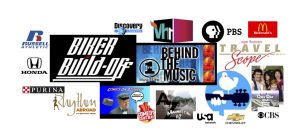LOOKING BACK
I was thinking about breaking my finger last year–first real injury to my hands over a 45 year career. Sometimes such events trigger a
nostalgic or reflective moment–as it did for me. Not playing guitar for 6 weeks was like a small child losing their special blanket or Teddy bear.
It never happened before–not being able to pick up my ax and play–it was terrifying. But more importantly, it was a wonderful confirmation
of how lucky I am to be a professional musician.
It made me appreciate the work I have been able to do on the shows whose logos are in this picture.
But, as cool as it is to get to do TV work and to have played on many albums, my reverie struck a deeper personal chord.
For me, the Beatles were the initial inspiration–how could one resist? Perhaps it was the lure of stardom, popularity and the camaraderie of
being in a band that drew me to music, but that quickly evolved into a passion for playing, a hunger to understand and explore the endless vista of a musical instrument and a deep respect for what I began to realize as a world wide, ancient human culture, a club that goes back into pre neolithic obscurity.
All of us, humble pickers or virtuosos like Joe Pass, Andre Segovia, Wes Montgomery, Stevie Ray, BB King or Carl Perkins–we all belong to the same club–the amazing club of guitarists. But more importantly, the larger club of MUSICIANS…like Mozart, Ravel, Miles Davis, Ravi Shankar, Cole Porter, Bach, Prince, Duke Ellington etc etc. All cultures have icons of music, all cultures have music that goes back as far as the definition of
their identity as a culture–be it in prayer or simply in song. Humans seem unable to exist without it–and that seems a simple obvious truth to me but perhaps it is much deeper than that…and perhaps now–with the digital revolution, it is time for music to be more critical to us than ever.
We now have in our hands in the form of a smart phone–which much of the population of the world now has–the ability to hear any music from anytime and any culture–on demand and for free. The universal language of all kinds of music can now truly be shared on a planetary scale.
Understanding, sympathy and empathy are more likely when one has shared experiences–a place to key into that becomes a window into the world of
people unlike ourselves. I have been very fortunate to take this journey actively as the composer of Travelscope, but anyone can do it by simply listening, extending themselves, broadening their exposure. This means of course, leaving the beaten path of what you are comfortable with–experimenting–exploring–and it is such fun…even if you don’t always love the music.
Some years ago I was asked to be part of a very interesting TV show called ‘Dissonance and Harmony.’ Studio Instrument Rentals(SIR)LA was booked out
and seven different musical acts from middle eastern countries were set up to play in various rooms with a camera crew and in some cases a full Pro Tools rig. A handful of western culture musicians were then invited to interact with these predominantly Arab musicians and see what evolved.
The western crew was RZA(wu-tang clan),Gustavo Santaolalla(Argentinian composer: Broke Back Mt.) Nile Rogers (Sheik, David Bowie etc)Charlotte Caffey (Go Gos), Jack Blades(Ted Nugent) and myself. We all wandered around separately from room to room making music, making friends and exploring new musical hybrids.To my delight and surprise, Iraqi born folk music legend, Iham Al Madfai, was a very accomplished nylon string guitarist who loved American standards.If you Google the show, you will see a photo of him jamming with me and Jack Blades. We found much common musical ground in his repertoire, but more importantly, we were able to improvise together, with Iham leading the way in an Iraqi style. Perhaps the most magical moment
for me was when I entered the room where an Egyptian traditional folk sextet was set up. I brought a bottle neck and an old harmony acoustic with me that day. The Egyptians had never heard slide guitar before and were delighted that I could mimic(to the best of my ability) their quarter tone
melodic ideas–especially when their wooden flute player got going. It was pure magic and smiles and we did not share a single word in common
linguistically–no Arabic for me and no English on their part.
We reached each other in the universe of music. I do not want to be too pollyanna about this–but it was special and it was a bridge and an
eye opening experience on both sides…acoustic slide took on a whole new meaning to me.
Interestingly, when I first was able too return to guitar after my broken finger, I picked up my slide(I use my pinky)so I would not stress my
injury too much. It reminded me of the sessions at SIR and it warmed my heart as I played Amazing Grace, remembering the look on the
Egyptians faces when I played it for them.
I am indeed so very lucky to be a musician.


